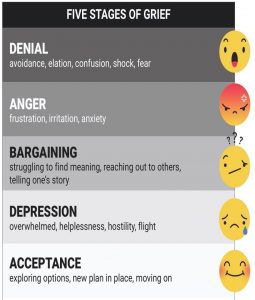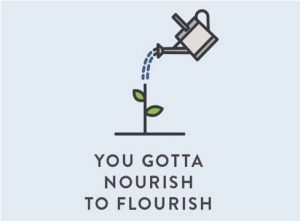Supporting Messages
Developed by the NJ DOH/DBHS Centralized Trauma Informed Care Committee
-
COVID-19: Supporting Your Staff and The People You Serve
SUPPORTING MESSAGE AND RESOURCES:
The COVID-19 pandemic has put us all into survival mode. We are now faced with a future of uncertainty and chaos, while trying to maintain some sense of control and order. It can feel overwhelming at times trying to manage our own feelings in response to this virus, along with our families and loved ones with the added pressures and expectations that come from work. As leaders, we not only have the pressure of maintaining safety and structure to our patients, but we must also consider the well-being of our staff. Staff in our state psychiatric hospitals are facing these same hard decisions about protecting their own health, the health and wellbeing of their loved ones and the patients they serve. Staff are in crisis too and looking to leadership for safety, compassion and acknowledgement of their efforts.
Today’s Focus: Take Care of Your Staff
From the American Psychological Association
How leaders can maximize trust and minimize stress during the COVID-19 pandemic: Several ways leaders can improve their communication skills to maximize trust and minimize stress and anxiety.
https://www.apa.org/news/apa/2020/03/covid-19-leadership
1. Remember to manage your own stress because it can have a direct effect on the quality of work from your workers and add stress and anxiety to their lives.
2. Share information with empathy and optimism- leaders should provide a sense of hope and control by providing specific steps to take to manage stress.
3. Use credibility to build trust- credibility is a combination of expertise and dependability. Leaders gain credibility when they demonstrate that they understand the risks and ramifications of a situation. Good leaders also admit when they don’t know the answer to a question and defer to other experts.
4. Be honest and transparent- effective leaders don’t hide bad news, which rarely stays hidden. Leaders who don’t share all the facts quickly become less credible, and that type of leadership can lead to more panic and overreaction.
5. Provide regular communications
6. Provide a forum for feedback- people will have questions and will want to offer suggestions. Leaders gain trust when those they support feel involved and heard.
7. Be a role model- leaders must behave consistently with what they are asking others to do.
From the American Medical Association Managing mental health during COVID-19:
https://www.ama-assn.org/delivering-care/public-health/managing-mental-health-during-covid-19/
Tips for helping to manage frontline staff well-being while also caring for patients during this pandemic or any other crisis.
Taking care of your staff:
1. Adjust staffing procedures and schedules (where possible)
2. Offer access to psychosocial support
3. Monitor and review staff member well-being
4. Create an environment of open communication
5. Praise staff for their accomplishments
Taking care of your patients:
1. Establish a system to identify and provide care for patients who are not coping well in response to this pandemic
2. Facilitate additional training for frontline staff
3. Verify referral pathways
4. Provide clear understandable communication to patients
5. Incorporate guidance about stress into general care practices
-
COVID-19: Supporting Yourself, Your Loved Ones, and The People You Serve
SUPPORTING MESSAGE AND RESOURCES #1:
The world looks very different than it did just a few weeks ago as a result of COVID-19 and its dramatic worldwide spread. The need to limit contact by physically distancing or self-quarantine has disrupted our routines, the way we work, our systems, and – for many of us – our physical, mental and emotional wellbeing.
Staff in our state psychiatric hospitals are facing hard decisions about protecting their own health, the health and wellbeing of their loved ones and the patients they serve. The World Health Organization, the Centers for Disease Control and Prevention, and the NJ Department of Health are reliable sources for up-to-date factual information. Here, we want to provide practical tips for supporting yourself, your loved ones, and the people you serve through this uncertain, ever-changing time.
Today’s Focus: Take Care of Yourself
The importance of take care can’t be emphasized enough. Caregivers often put their own needs for wellbeing second by focusing on taking care of others. If you don’t attend to your own needs, over time you will start to feel the symptoms of stress taking over. Take time to check in with yourself and people around you. How are you feeling? If you’re not sure how to “check in” with yourself, try some guided mindfulness exercises. Many mindfulness apps offer these for free (see list of downloadable apps at the bottom).
MAKE TIME FOR YOURSELF EVERY DAY, EVEN IF IT’S JUST TWO MINUTES.
Helpful Resources
From the American Medical Association Managing mental health during COVID-19:
https://www.ama-assn.org/delivering-care/public-health/managing-mental-health-during-covid-19
Tips for helping to manage frontline staff well-being while also caring for patients during this pandemic or any other crisis:
1. Feel free to feel your feelings
2. Intentionally apply coping skills
3. Perform regular check-ins with yourself
4. Take breaks from news and social media
5. Be fortified by remembering the importance and meaning of your life
From the American Psychological Association Self-care advice for health-care providers during COVID-19:
Health-care providers and other hospital and clinic staff are on the front lines of the COVID-19 pandemic. Many providers are balancing competing demands, caring for patients, respond to families and to loved ones. However, self-care is very important and here are concrete strategies to help manage stress during these challenging times:
1. Share your concerns and problem solve with colleagues, family and friends to plan coping steps
2. Pace and monitor yourself
3. Practice mindful breathing several times a day
4. Maintain good health habits
5. Exercise, even short walks everyday
6. Connect, connect and connect again
7. Take breaks at work and at home
8. Flexibility and adaptability are essential- It’s OK. Ask for support, evaluate, modify and move forward
FREE DOWNLOADABLE APPS
-
HEADSPACE(https://www.headspace.com): Offers guided and unguided meditations.
-
INSIGHT TIMER (http:/www.insighttimer.com): For sleep, relaxation and more.
-
BREETHE (http://www.breethe.com): Relaxing sounds and guided meditation to sleep better, breathe & be calm.
-
CALM (https://www.calm.com): Meditation and sleep stories.
-
Down Dog Yoga (https://www.downdogapp.com/healthcare): Showing yoga practices
-
Mood Mission (http://moodmission.com): It gives a tailored list of 5 simple, quick, effective, strategies to improve mood.
-
Happify (https://www.happify.com/public/science-behind-happify/): It is grounded in the fields of positive psychology, mindfulness and cognitive behavioral therapy and uses activities and games to help you control your thoughts and feelings.
-
Breathe2relax (https://breathe2relax.soft112.com): Helps manage and track breathing.
-
Tapping Solution Meditations (https://www.thetappingsolutionapp.com/responder.php): A curated Coronavirus Stress and Anxiety collection.
-
-
Social Connecting Activities While Physically Distancing

*Photo Credit to Summer Serpas
Examples of socializing while maintaining at least 6 feet of physical distance:
- Eat a meal or enjoy a drink and socialize at the end of driveways, from each other’s backyards, porches, balconies or even doorways
- Park next to each other and eat meals in cars
- Bike, jog or walk with the appropriate physical distance
- “Chalk the Walk”- create decorative and inspirational messages/pictures with chalk on sidewalks
- Participate in a virtual community activity (e.g. virtual Easter egg hunt, car parade for a birthday, etc.)
- Create beautiful spring decorations (e.g. windows, porch, yard, front door) to uplift people’s spirits
- Put inspirational items in windows (e.g. “Teddy Bear Hunts in London”)
Social activity ideas through video communications:
- Virtual/social hangout (e.g. Zoom, FaceTime)
- Book Club
- Play musical instruments together
- Karaoke
- Take an online yoga or exercise class
- Online Church Service
- Crafting night with friends (collages, jewelry making, knitting, etc.)
- Online Comedy Night
- Teach friends a new skill (e.g. musical instrument, new language, art lesson, etc.)
- Virtual Conferences
- Dinner Party
- Coffee/Teatime
- Watching a movie together through Netflix Party/Twoseven
- Attend a virtual support group (e.g. AA/NA, anxiety, depression, medical support group)
- Paint Night
- Dance Party (e.g. DJ’s hosting free parties)
- Stream a concert together
- Online Exercise Group
- Baking and/or cooking together
- Game Night (e.g. trivia, bingo, charades, scavenger hunt, “Two Truths and a Lie”, etc.
- Meditation
-
Tips for Working at Home for Increased Effectiveness

Many staff are working from home without much prior experience since this was not an available option before the pandemic. Below are some tips that you might find helpful for this specific and novel challenge of working from home.
- Set up a designated workspace (where you can leave work behind), if possible
- Establish a work schedule (e.g. a start and end time for work, lunch break, etc.)
- Use a calendar (e.g. outlook) to schedule meetings, assignments, and tasks
- Create and maintain boundaries (e.g. no more emails or calls after work hours/lunch)
- Limit distractions (e.g. TV, cell phone, etc.)
- Get ready as if you were going to work even though you are not leaving the house
- Check in with yourself and notice how you are feeling several times a day (part of self-care)
- Allow for breaks throughout the day, move around, and try to get fresh air
- Use breaks for mindfulness exercises or other helpful tools (meditation, yoga, etc)
- Coordinate with family/roommates during important meeting times in order to prevent interruptions (i.e. children or pets interrupting a conference call)
- Ask for regular check-ins with your supervisor
- Conduct an end of the day check-in to review accomplishments
- Create a timeline for bigger work assignments and break them into smaller tasks
- Create daily to-do lists
- Schedule alarm reminders for important meetings and assignments
- Organize your desktop and computer files
- Lean on your co-workers and supervisors for support
Zones Responding to Crisis
The graph below depicts different “Zones” people can be in, in response to Covid-19.

Which “zone” do you find yourself in? Fear Zone, Learning Zone, or Growth Zone?
Wherever you picture yourself, consider options, if you are not satisfied.
Just some “Food for Thought”!
-
COVID-19: Supporting Yourself, Your Loved Ones, and The People You Serve
SUPPORTING MESSAGE AND RESOURCE #4:
TODAY’S FOCUS: GRIEF AND LOSS
The COVID-19 pandemic crisis affects many different facets of our life. It can provoke anxiety, stress and sadness, to name just a few. Independent of individual losses, including illness and death, or loss of financial stability, we are also in the middle of having lost our sense of normalcy, which might include freedom, safety, predictability, control, fairness, and the belief that we can protect ourselves and loved ones.
The crisis is threatening our understanding of the world around us and it is our challenge to make sense out of it.
The 5-Stages of Grief (Elizabeth Kübler-Ross) is a well-recognized model that grief and loss experts use to guide those who are experiencing loss and grieving themselves or help others. Please find this theoretical model attached, but keep in mind that we all grief differently and at our own pace.
Just remember:
- Grief is a natural part of life
- It’s okay to feel grief over what we’re losing
- It helps to “name and claim” our grief
- It serves us well to allow ourselves to grief
- Most people bounce back and move on with their lives after a period of grief
Helpful Resource:
Model of 5-Stages of Grief (see below)

-
Structure, boundaries, and gentle, loving self-care
If a dear friend told you they were feeling anxious, depressed, overwhelmed, distracted or unable to focus and couldn’t see their way through it, how would you react?
It can be very difficult to be kind to ourselves (even if we know it’s good for us). However, the less grace we have for ourselves, the less likely we are to feel motivated to get up and get going.

If we practice good personal boundaries, we would prioritize our rest. If we were to prioritize our rest, we wouldn’t extend ourselves to help out whenever needed. Without knowing how to set boundaries for ourselves, we end up disappointed, hurt, burned out, etc.
But we can practice self-love by making personal guidelines for our own behavior. If you are going to work, remember you are living in a crisis. If you work from home, understand that you are not living in a staycation but are also in a crisis.
It is paramount to schedule daily rest and daily breaks whether you work from home or in the hospital. Treat yourself the way you would an anxious and overextended friend or co-worker or child. Practice structure, boundaries, and gentle, loving care.
For more information please access the link below in Psychology Today:
https://www.psychologytoday.com/us/blog/get-hardy/201203/seven-step-prescription-self-love?eml
-
Self-Care Resources
Researchers warn that a historic wave of mental-health problems might approach in response to Covid-19 with increases in depression, substance abuse, post-traumatic stress disorder and suicide.
However, this does not have to happen, especially if support and treatment options are utilized, before burnout hits. Via this supporting message we want to remind you that there are free supports specifically tailored towards hospital staff in place.
For details please click the following link for a summary of self- care resources.
Summary Self-Care Resources May 2020 with APPs
Consider taking advantage of one or more of the offers that might help you in dealing with the current difficult situation. Be reminded that the one essential we need most is each other (#nowmorethanever).
It is not a sign of weakness to reach out for support and take advantage of available resources but a STRENGTH. You are in the DRIVER’S SEAT!